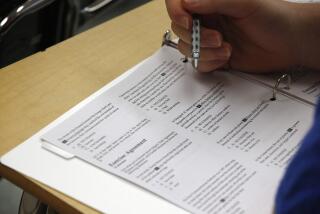SAT’s Essay Question Spells Stressful Prep
- Share via
Writing, Audrianna Galvin says forthrightly, has never been her strong suit.
So the teenager was more than a little anxious when makers of the SAT college entrance exam announced in 2002 that a revised version of the test would, for the first time, include a handwritten essay.
“The whole idea of the writing section just really freaked me out,” said Audrianna, 16, a junior at the private Buckley School in Sherman Oaks. “I thought, ‘How on earth could I do that?’ ”
Now, with the debut of the new, longer SAT -- and its fear-inducing writing section -- two weeks away, Audrianna says she is feeling somewhat better. She has gained some confidence from hours spent on preparation, in classes and on her own. “But I’m still pretty nervous,” she admits.
Other college-bound students are also stressed over the high-stakes test. They’re filling test prep classes in record numbers, mainly, they say, to practice for the essay. For the exam itself, they will have 25 minutes to write, clearly and persuasively, on such broad philosophical topics as “Do people need to keep secrets or is secrecy harmful?”
Some students also seem loath to be among the first to face the new SAT. Enrollments for its initial offering, on March 12, are significantly lower than those for the essay-less test last March. Officials with the College Board, which owns the exam, said the 11% dip in registration is similar to a drop in March 1994, when an earlier revision of the test was introduced.
But many counselors and other experts are urging students -- and parents -- to keep calm. They point out that the essay, the subject of most of the nervous chatter surrounding the new test, will count for only about one-ninth of a student’s overall score.
“They all need to take a deep breath and relax,” said Jennifer Karan, director of SAT and ACT programs for Kaplan Test Prep.
Along with the essay, the revamped SAT will feature more advanced math problems, new kinds of grammar questions and an expanded reading comprehension section. Two sections, verbal analogies and quantitative comparisons, have been eliminated. The total time for the test will jump from three to nearly four hours, the highest possible score from 1600 to 2400 and the cost from $29.50 to $41.50.
About 2.3 million students take the exam each year, with many enduring it more than once to try to improve their scores.
The University of California, the test’s biggest customer, had pushed for the changes in the SAT, saying the old version was not fair and did not reflect what students were taught in high school. Although some critics are still not happy with the exam, the SAT remains an admissions requirement for many of the nation’s most competitive colleges.
That makes it a worry for students like Samuel Kianmahd, 15, who recently sat through a free essay workshop in Encino, even though he’s a sophomore.
The prospect of a timed writing sample “is kind of scary,” said Samuel, a student at Milken Community High School in Los Angeles.
Samuel and other students had spent the first part of the Kaplan workshop writing a practice essay. The topic: whether free time or structured time is more likely to develop children’s creativity. Instructor Stephanie Wieland later said, teasing them, that most opted for essays about idleness.
But, she asked, what examples from their lives or their readings did they use to support their arguments? A girl mentioned Huck Finn, the delightfully unscheduled 13-year-old hero of Mark Twain’s literary classic.
“That’s an awesome example,” Wieland said.
Another girl in the front row said she had made a case for structured play, exemplified by the scheduled art time she enjoyed in day care. Wieland agreed. “Fantastic,” she said, adding that paint-by-numbers books and practice time for instrumental music were also good examples of the concept.
On another weekend afternoon, about a dozen students were scattered about a classroom at North Hollywood High School, learning about the new SAT. Kaplan instructor Shain Alexander drilled them on advanced algebra questions, then -- amid groans from his students -- turned to the essay.
The most important thing, the instructor said, is for test takers to address the topic and not be wishy-washy about choosing a position. “No one cares if you agree with it,” said Alexander, a UCLA graduate. “You just have to be able to support the side you pick.”
What about handwriting, a student asked? “Well, they need to be able to read it,” replied Alexander.
And finally, this piece of advice: Avoid controversy. For example, Alexander said to laughter from his students, “Don’t write about your six months in rehab.”
Some in the class appeared to be taking the changes in stride as they looked over their practice essays corrected by Alexander. Over the 12 class sessions, they would write such compositions again and again.
Gayane Zorabian, 17, said she hoped that the new writing section might even help her score. “I’d rather have the essay than analogies any day,” said Gayane, a junior at Valley Alternative Magnet School in Van Nuys.
David Benjamin Gruenbaum, who owns Irvine-based test prep company Ahead of the Class, said many of his students worry more about the test’s longer length than its new essay.
“I joke that they’re trying to create a new TV show called ‘SAT Survivor,’ ” Gruenbaum said. “It’s tough for 16-year-olds to sit still for that long.”
For the exam, students will be asked to write a persuasive essay, one in which they take a point of view, said James M. Montoya, the College Board’s vice president for higher education assessments and services. No specific knowledge is required, but students are asked to support their positions with examples from their reading, studies or experience.
The essay does not have to be very polished. “This is a test of first-draft writing, not unlike the kind of writing they might do in a blue book for a college midterm,” Montoya said.
Rewriting or editing skills will be tested on the grammar portion of the new writing section, which counts about twice as much as the essay. Multiple-choice questions will ask students to identify grammatical errors and the best ways to improve sentences and paragraphs.
Montoya and other College Board officials advise students not to get overly worried, adding that they may feel more confident if they spend some time reviewing. They can enroll in prep classes for which they pay or in the many free workshops available through schools and private firms. Another option is to study the practice questions posted on the College Board’s website, www.collegeboard.com.
For the essay, Montoya advises, students should strive for clear, uncomplicated writing. “Good writing usually reflects good and clear thinking,” he said.
As students gear up for the new test, so too is a small army of essay scorers, mainly high school and college English teachers. Chosen from more than 9,000 applicants across the country, the 3,000 scorers next week will spend an average of 10 hours at their own computers, learning to evaluate writing samples “holistically” and consistently, grading them on a scale from zero to 6.
A 6, according to the College Board, is the grade for an outstanding essay that demonstrates clear and consistent mastery of the topic, although it may have a few small errors. A 3 is the appropriate grade for an essay considered inadequate and limited in many ways but that shows some fledgling writing and critical thinking skills. A score of zero is reserved for essays that do not address the question.
The trainees will study pre-scored essays and practice on 30 others written on a topic that, for security reasons, is not the one on the test, said Daisy Vickers, who is in charge of the training for Pearson Educational Measurement, an Iowa firm under contract to the College Board. After the test date, scorers will receive another set of practice essays, this one on the actual topic, Vickers said.
Scorers will begin their official reading of the scanned writings three days after the March 12 test -- perhaps inauspiciously, superstitious students might note -- on the ides of March.
To ensure consistency, “validity papers” already scored by others will be secretly mixed in with the actual tests each reader receives. “We will be watching constantly,” Vickers said, noting that technology makes it possible to do so, even with readers scattered across the country.
Vickers and College Board officials shot down a rumor among nervous young test takers that scorers will assess each paper in two minutes or less. Although there is no set time per essay, graders are encouraged to read fairly quickly and evaluate each paper as a whole, she said.
“If they spend too long, they may over-analyze it and take it apart too much,” Vickers said.
Audrianna and others about to take the new test just hope that the scorers might go a little easy on those students who are brave enough to take it the first time out. And if not, the high school junior says, “I’ll have enough time to take it again in May, or June, or the fall.”
*
(BEGIN TEXT OF INFOBOX)
‘Think carefully’ with pen in hand
Here’s a sample question for the new essay portion of the SAT. Test takers will have 25 minutes to compose a handwritten response, using no more than the two lined pages provided in their test booklets.
Think carefully about the issue presented in the following quotations and the assignment below.
A. While secrecy can be destructive, some of it is indispensable in human lives. Some control over secrecy and openness is needed in order to protect identity. Such control may be needed to guard privacy, intimacy, and friendship.
Adapted from Sissela Bok,
“The Need for Secrecy”
B. Secrecy and a free, democratic government, President Harry Truman once said, don’t mix. An open exchange of information is vital to the kind of informed citizenry essential to healthy democracy.
Editorial, “Overzealous Secrecy
Threatens Democracy”
Assignment: Do people need to keep secrets or is secrecy harmful? Plan and write an essay in which you develop your point of view on this issue. Support your position with reasoning and examples taken from your reading, studies, experience, or observations.
*
Source: The College Board
Los Angeles Times


